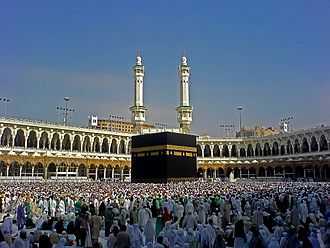Standing in salat
Standing (Arabic: قيام) is an integral part of the Islamic salat. The prayer begins in the standing position and some prayers only require the standing position, such as Salat al-Janazah.
In the Quran
To "Stand before God" is sometimes used in the Quran in reference to the Islamic prayer.
Guard strictly your (habit of) prayers, especially the Middle Prayer; and stand before Allah in a devout (frame of mind).
—Quran, (2:238)
Overview
A general unit or cycle of salat called raka'ah is commenced while standing and saying the takbir, which is الله أَكْبَر (transliteration "Allahu-akbar", meaning God is Greater). The hands are raised level with shoulders or level with top of the ears, with fingers apart and not spaced out or together.[1][note 1] Both arms are placed over the chest, with the right arm over the left.[2] It is in this position that sections of the Quran are recited.
I'tidal is standing again after ruku'. The back is straightened with the hands raised as in takbir as mentioned before but saying سمع الله لمن حمده (transliteration “Sami' Allaahu liman hamidah”, meaning “Allah listens and responds to the one who praises him”).[3] Additionally, some of many praises to God for this situation is said such as ربنا لك الحمد (transliteration “Rabbanaa wa lakal-hamd”, meaning “O our Lord! And all praise is for You”).[4] The takbir is said again and the worshipper moves into prostration with hands on the ground before knees.[5]
Types of prayers
In the five daily prayers, sunnah salat (the voluntary, additional prayers) and most other prayers, standing is one part of the prayer.
In salat al-Janazah, the Islamic funeral prayer which is part of the Islamic funeral ritual, the entire prayer consists of standing.
Sayings during standing
Most of the reciting of the Quran that occurs during Islamic prayer is done while in standing position. The first chapter of the Quran, Surah Al-Fatiha, is recited while standing.[6] Sahih Muslim recorded that Abu Hurayrah said that the Prophet said, «مَنْ صَلَى صَلَاةً لَمْ يَقْرَأْ فِيهَا أُمَّ الْقُرْآنِ فَهِيَ خِدَاجٌ ثَلَاثًا غَيْرُ تَمَامٍ» (Whoever performs any prayer in which he did not read Umm Al-Qur'an, then his prayer is incomplete.)
Additionally, recitations from any other section from the Quran of choice is followed in the first or second raka’ah.[7]
See also
- Ruku'
- Sujud
- Sitting in salat
Notes
- ↑ For the able-bodied, leaning or not standing upright invalidates prayer. If one is incapable of standing, one may sit, lie on the right side, lie on the left side, lie on one's back or as one is able to do.
Footnotes
- ↑ Al-Albani 1993, pp. 10–11.
- ↑ Al-Albani 1993, pp. 11–12.
- ↑ Al-Albani 1993, pp. 47.
- ↑ Al-Albani 1993, pp. 48–50.
- ↑ Al-Albani 1993, pp. 51–52.
- ↑ Al-Albani 1993, pp. 20.
- ↑ Al-Albani 1993, pp. 25.
References
- Naasir-ud-Deen Al-Albani, Muhammad (1993). The Prophet’s prayer described (1st ed.). Malaysia: Al-Haneef Publications. p. 15.
| |||||||||||||||||||||||||||||||||||||||||||
